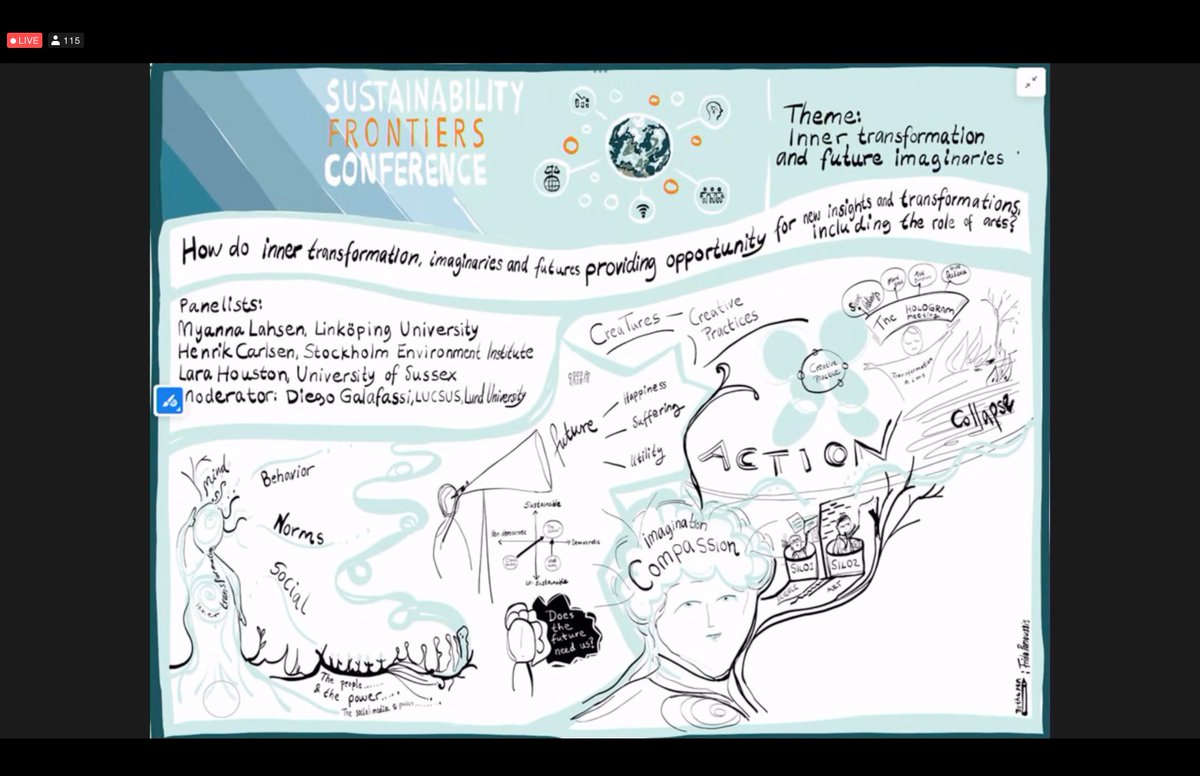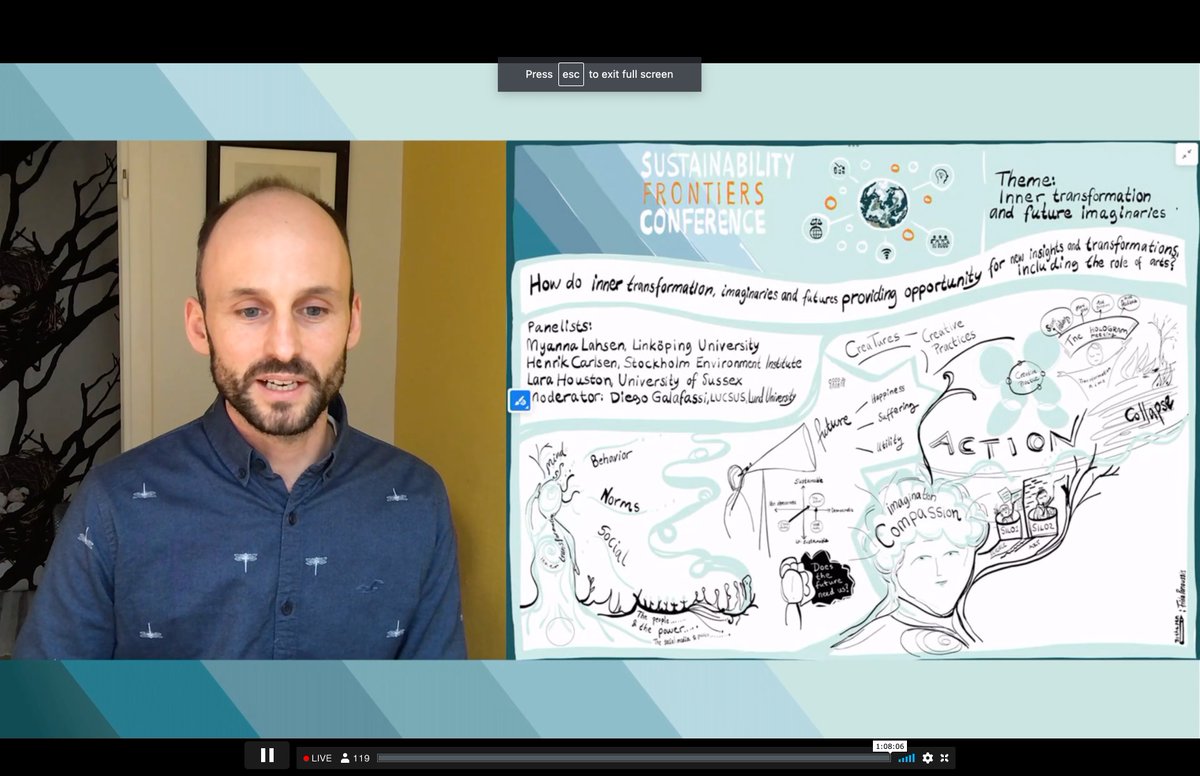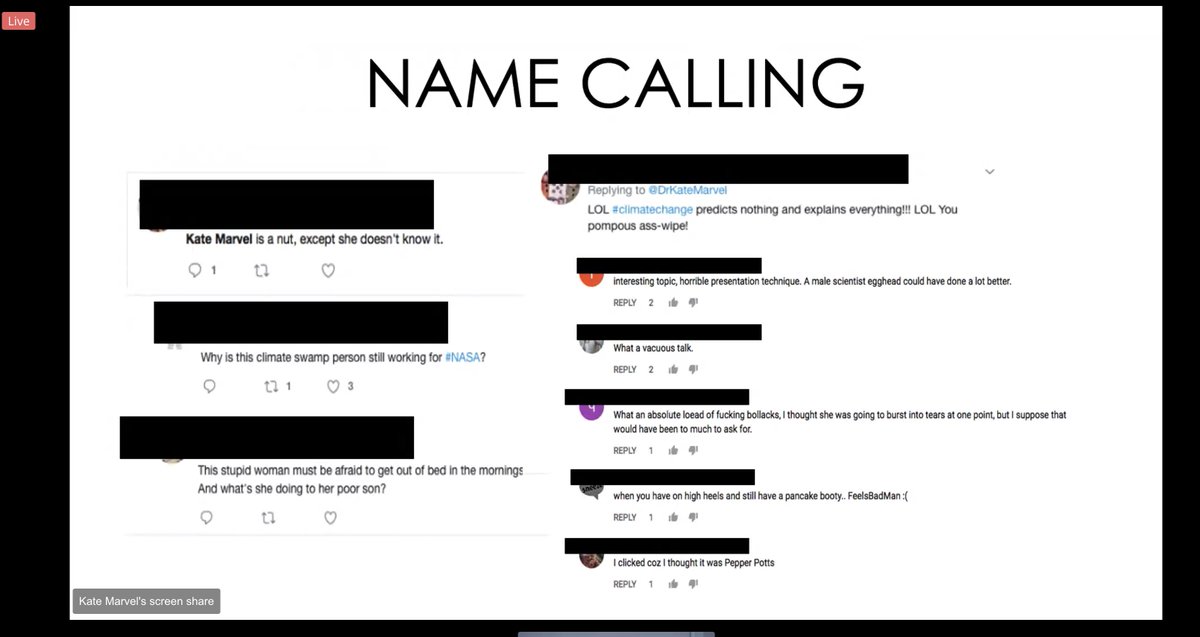
I'm live-tweeting today and tomorrow from the #SustainabilityFrontiers conference. Follow for insights on where #SustainabilityScience is now, gaps, and how we create just nature-society relations.
Hosts: @LUCSUS_LU & @SEIresearch, inspiration: @theNASEM, annualreviews.org/doi/abs/10.114…
Hosts: @LUCSUS_LU & @SEIresearch, inspiration: @theNASEM, annualreviews.org/doi/abs/10.114…
https://twitter.com/LUCSUS_LU/status/1493132508518621187
Don't miss the graphic recording of the #SustainabilityFrontiers conference here: behance.net/gallery/137130…
The conference is NOT being recorded-- welcome to follow and engage live! 2/
The conference is NOT being recorded-- welcome to follow and engage live! 2/
Sustainability science is still defining itself, argues Vasna Ramsar. Concepts like #foodsovereignty drawn from Indigenous knowledge are gaining ground as part of #decolonizing the field. #SustainabilityFrontiers /3
Sustainability & ecology rooted in colonialism, focused on conserving/exploiting nat resources in Global South, w/ devastating social & evt impacts, argues @Lylamehta. Aims to preserve nature in "tropics" = modern fortress conservation, dispossession. #SustainabilityFrontiers /4
Limits, planetary boundaries approaches can reinforce the power of the powerful & colonial governance, argues @Lylamehta. We should seek multiple perspectives incl cognitive justice; see colonial perceptions as destructive (grasslands aren't wastelands) #SustainabilityFrontiers/5
Sustainability science must confront Western hegemony of:
1. Thought (Descartes, individualism)
2. Paradigms (e.g., positivism, vs Indigenous "I am bc we are")
3. Development (GDP; vs freedom to choose & participate)
argues Bagele Chilisa @UBBotswana #SustainabilityFrontiers/6
1. Thought (Descartes, individualism)
2. Paradigms (e.g., positivism, vs Indigenous "I am bc we are")
3. Development (GDP; vs freedom to choose & participate)
argues Bagele Chilisa @UBBotswana #SustainabilityFrontiers/6
#Decolonizing (incl in Sweden) needs to recognize:
1. Colonial structures to exploit nature & land
2. Conflicts from colonial political, research strategies
3. Educate on Indigenous issues, beyond stereotypes
argues @DrDrugge
#SustainabilityFrontiers/7
1. Colonial structures to exploit nature & land
2. Conflicts from colonial political, research strategies
3. Educate on Indigenous issues, beyond stereotypes
argues @DrDrugge
#SustainabilityFrontiers/7
How do we make ppl understand #decolonizing is good for everyone; make mainstream paradigm realize "What's in it for me? What do I gain from using a #decolonial perspective?" Developing those arguments will be what moves the field, argues @DrDrugge #SustainabilityFrontiers /8
Some practical guidance for #decolonizing research:
SAN code of research ethics, based on respect, honesty, justice, care, process. trust-project.eu/wp-content/upl…
Linda Tuhiwai Smith (2021). Decolonizing Methodologies. bloomsbury.com/us/decolonizin…
#SustainabilityFrontiers /9
SAN code of research ethics, based on respect, honesty, justice, care, process. trust-project.eu/wp-content/upl…
Linda Tuhiwai Smith (2021). Decolonizing Methodologies. bloomsbury.com/us/decolonizin…
#SustainabilityFrontiers /9
Visual summary of the first #SustainabilityFrontiers session on #Decolonizing hosted by Vasna Ramsar /10 

Cases of practicing #decolonizing research in #sustainability science:
Mainstream climate scientists working w/ First Nations, from @Guy__Climate
lucris.lub.lu.se/ws/portalfiles…
Ethics in Indigenous research by @DrDrugge
tinyurl.com/ytxnpask
#SustainabilityFrontiers /11
Mainstream climate scientists working w/ First Nations, from @Guy__Climate
lucris.lub.lu.se/ws/portalfiles…
Ethics in Indigenous research by @DrDrugge
tinyurl.com/ytxnpask
#SustainabilityFrontiers /11
Papers on #decolonization recommended by #SustainabilityFrontiers attendees:
#LandBack, Tuck & Yang: jps.library.utoronto.ca/index.php/des/…
decolonial feminist praxis, Abazeri: sciencedirect.com/science/articl…
#RedDeal:
commonnotions.org/the-red-deal
Conway & Lester syllabus:
docs.google.com/document/d/1nq…
/12
#LandBack, Tuck & Yang: jps.library.utoronto.ca/index.php/des/…
decolonial feminist praxis, Abazeri: sciencedirect.com/science/articl…
#RedDeal:
commonnotions.org/the-red-deal
Conway & Lester syllabus:
docs.google.com/document/d/1nq…
/12
Papers on #decolonization recommended by #SustainabilityFrontiers attendees:
Interspecies Sustainability, by @IrisMBergmann
ses.library.usyd.edu.au/handle/2123/25…
& mdpi.com/2071-1050/11/1…
& mdpi.com/2504-3900/73/1…
Epistemologies of the South:
read.dukeupress.edu/books/book/247…
/13
Interspecies Sustainability, by @IrisMBergmann
ses.library.usyd.edu.au/handle/2123/25…
& mdpi.com/2071-1050/11/1…
& mdpi.com/2504-3900/73/1…
Epistemologies of the South:
read.dukeupress.edu/books/book/247…
/13
More #decolonization resources from #SustainabilityFrontiers:
Ethical Uncertainty in Swedish Sami Research, @DrDrugge: doi.org/10.1007/s10805…
Student role in higher ed, @sachbon et al: hogreutbildning.se/index.php/hu/a…
Gorgeous video, rural Japan research: vimeo.com/151611926
/14
Ethical Uncertainty in Swedish Sami Research, @DrDrugge: doi.org/10.1007/s10805…
Student role in higher ed, @sachbon et al: hogreutbildning.se/index.php/hu/a…
Gorgeous video, rural Japan research: vimeo.com/151611926
/14
Resistance and social movements session, #SustainabilityFrontiers
Gustavo García-López highlights inspiration from casapueblo.org - defeated a mining project (1st protest had only 3 people!). Built success w/ messages of sovereignty, local traditions, community. /15


Gustavo García-López highlights inspiration from casapueblo.org - defeated a mining project (1st protest had only 3 people!). Built success w/ messages of sovereignty, local traditions, community. /15



Why do people resist #ClimateAdaptation projects? Drawing from narrative of Tuvalu as sinking, victimized, @AnaVargasFalla @ICLD_Sweden studies movement narrative in Cartagena: human rights, global citizenship, collective action, mobility not refugees #SustainabilityFrontiers/16 



Conclusions from @AnaVargasFalla:
Connect #climatechange w/ global justice. "We cannot be environmental fundamentalists," must meet people's needs, incl. mobility.
Resistance to #ClimateAdaptation includes hope and demand for mitigation. #SustainabilityFrontiers/17
Connect #climatechange w/ global justice. "We cannot be environmental fundamentalists," must meet people's needs, incl. mobility.
Resistance to #ClimateAdaptation includes hope and demand for mitigation. #SustainabilityFrontiers/17
Resistance=a limit social actors put on allowing others to decide for them; can unlock desired futures. Resistance movements create conflict, shine a light on conflicting values- can uncover sustainability like #EJAtlas, argues Salvatore Paolo De Rosa #SustainabilityFrontiers/18
Time to move from #sustainability to reciprocity, argues Salvatore Paolo De Rosa.
Ask: does it give as much as it takes?
Sust = maintaining a pool of resources
Reciprocal = nurture, enhance, deepen what's good. Look to Indigenous & peasant examples
#SustainabilityFrontiers/19
Ask: does it give as much as it takes?
Sust = maintaining a pool of resources
Reciprocal = nurture, enhance, deepen what's good. Look to Indigenous & peasant examples
#SustainabilityFrontiers/19
Local Democracy Labs @ICLD_Sweden: 1 hour on Zoom, politicians ask a concrete question, researchers answer (& learn!). They give researchers a way to make direct impact, connect w/ communities. @AnaVargasFalla icld.se/en/article/loc…
#SustainabilityFrontiers /20
#SustainabilityFrontiers /20
"We need to make the familiar, unfamiliar" quotes @AnaVargasFalla in order to make sustainability transformations happen in practice. Here is a visual summary of the Resistance & Social Movements session from #SustainabilityFrontiers by Frida Panoussis /21 

Eric Kemp-Benedict @SEIresearch sees sustainability as "flourishing within @KateRaworth's donut" bounded from above by material limits.
flourishing= enjoy yourself, be occasionally foolish & make mistakes from time to time without catastrophe
#SustainabilityFrontiers /22
flourishing= enjoy yourself, be occasionally foolish & make mistakes from time to time without catastrophe
#SustainabilityFrontiers /22
"Prudent assumption for policy is: decoupling (GDP & CO2) is not possible" says Eric Kemp-Benedict. Don't replace GDP; but most news focuses not on GDP but on employment, gas prices, inflation, & stock market (feeds 24h news cycle). #SustainabilityFrontiers #degrowth /23
Recent economic growth has made rich richer, while failing to lift poor out of poverty; as economy grows, envt impacts continue to worsen, says
@Hintojen. #postgrowth sustainability: don't assume more GDP improves wellbeing. Measure what matters #SustainabilityFrontiers /24
@Hintojen. #postgrowth sustainability: don't assume more GDP improves wellbeing. Measure what matters #SustainabilityFrontiers /24
"Mindless consumerism is not an inherent part of human nature, it arises from a specific way of structuring the world and seeing society" says @Hintojen. #postgrowth aims for local production/consumption, sufficiency, democracy, sharing networks. #SustainabilityFrontiers /25
50 years since #LimitsToGrowth established business as usual = continued growth of GDP & population. This path leads to collapse, says @g_kallis. Efficiency, tech postpone, do not prevent. Need #degrowth to stabilize. How? Stay tuned! #SustainabilityFrontiers /25
"Property rights have a tight relationship with growth" says Eric Kemp-Benedict @SEIresearch.
Money becomes one of many means to satisfy needs in a #postgrowth economy; money cannot meet all needs (e.g., affection) says @Hintojen. #SustainabilityFrontiers /26
Money becomes one of many means to satisfy needs in a #postgrowth economy; money cannot meet all needs (e.g., affection) says @Hintojen. #SustainabilityFrontiers /26
Visual summary of the #degrowth panel from #SustainabilityFrontiers featuring @g_kallis, Eric Kemp-Benedict, @Hintojen & moderator @MineIslar. /27 

"Talking about digitalisation at a digital conference feels like breaking the 4th wall" @stefandaume starts Day 2 of #SustainabilityFrontiers in "Digitalisation and sustainability transitions" session. AI tools now avail for sustainability research (see refs) but serve BAU.
/28

/28


Some blockchain aims to be "for good" but also can support illegal activity. NFTs were briefly used by NGO but withdrawn with criticism. "Human-machine ecology" should align tech w/ their social-ecological impact, says @stefandaume #SustainabilityFrontiers /29 







"@scitingly is a personal science initiative to harness social media for environmental monitoring, create public awareness for critical environmental challenges and mobilise communities for citizen science" -scitingly.net @stefandaume #SustainabilityFrontiers /30
Storytelling defines and forms our beliefs, and by extension, actions. Algorithmic tech like machine learning are storytellers: they create characters, plot, time & place, and sustainability scientists must engage w/ them, says Maja Essebo @LUCSUS_LU #SustainabilityFrontiers /31
Anthropocentrism = belief humans distinct & better than rest of world/nature (seen as dead, or economic material humans free to use). AI ethics now ignore non-humans, which perpetuates harm. Sust is broader than just "good for people". @OweAndrea #SustainabilityFrontiers /32
Inner transformations in sustainability often misunderstood as solipsism, self/ego-directed; in fact aims to connect personal to systemic change. What seems private, inner, is also social and political. @LahsenMyanna #SustainabilityFrontiers /33
"The elite keep their wealth through media ownership."
Media, repetition key to how ppl acquiesce to power -- missed in sustainability assumptions that mobilisation automatically leads to scale, activism to change norms/behavior. @lahsen_myanna #SustainabilityFrontiers /34
Media, repetition key to how ppl acquiesce to power -- missed in sustainability assumptions that mobilisation automatically leads to scale, activism to change norms/behavior. @lahsen_myanna #SustainabilityFrontiers /34
Scenarios assume the goal of sustainability is for all societies to become sustainable and democratic- but Henrik Carlsen argues that China wants to show that sustainability can be achieved under a non-democratic state. #SustainabilityFrontiers /35 

Alternative ethical standpoints (eg maximise happiness, vs. minimise total suffering) are missing from sustainability analysis, but could lead to different conclusions about how to structure a sustainable society, need discussion. Henrik Carlsen #SustainabilityFrontiers /36 

Literature & art increase diversity of thinking abt sustainable future. Example of climate fiction where climate is changing not due to human activities, but humans feel responsible; opposite of today.
Does the future need us? asks Henrik Carlsen #SustainabilityFrontiers /37
Does the future need us? asks Henrik Carlsen #SustainabilityFrontiers /37

"enabling the shared imagining of sustainability transformations" especially meanings & feelings: @Lara_Houston on @CreaturesEu project linking creative practitioners and researchers, e.g., Cassie Thornton's THE HOLOGRAM (

https://twitter.com/MarkFabian_UTas/status/1492971399215935489?s=20&t=0MvEgtCsfH1ObyqQJqx9WQ). #SustainabilityFrontiers /38


There's wide agreement on unsustainable outcomes & futures, but almost none on what a sustainable future looks like, argues Henrik Carlsen @SEIresearch. Different disciplines need to deeply inspire each other, museums and art needs to deeply provoke. #SustainabilityFrontiers /39
One consequence of attempting to make science "values-free" is that it dumps all values work on arts and practitioners to implement what hasn't worked to change from research. Need to overcome relations of domination says @Lara_Houston #SustainabilityFrontiers /40
Visual summary of Inner Transformations for Sustainability session, very skilfully moderated by @vijen #SustainabilityFrontiers /41 



Does #degrowth belong as a pillar of sustainability science? @william_c_clark argues it's a specific policy prescription, on a different level than other conference themes. We can build on past research to really push #SustainabilityFrontiers. /42 



#Sustainability science:
Needs to get beyond "we" to focus on specific actors, capacities, roles, responsibilities.
Find a modern role for leadership
Reconcile incremental & transformative change (can be delay tactic!), says @Perssonasa @SEIresearch #SustainabilityFrontiers /43
Needs to get beyond "we" to focus on specific actors, capacities, roles, responsibilities.
Find a modern role for leadership
Reconcile incremental & transformative change (can be delay tactic!), says @Perssonasa @SEIresearch #SustainabilityFrontiers /43
Sustainability challenges: can't be reduced to one set of measurable indicators- but who defines? Mainstreaming sustainability a challenge due to unresolved conflicts within the field. Risks from not engaging with new topics. @EGKBoyd @LUCSUS_LU #SustainabilityFrontiers /44
"How do we move from knowledge to empathy and action?" asks Somya Joshi @SEIforskning to the #sustainability scientists at #SustainabilityFrontiers. /45
What should be top 3 priorities for #Sustainability Science in the next 5 years?
Now being debated live by @william_c_clark, @EGKBoyd, @Perssonasa, Somya Joshi @SEIforskning at #SustainabilityFrontiers
/46
Now being debated live by @william_c_clark, @EGKBoyd, @Perssonasa, Somya Joshi @SEIforskning at #SustainabilityFrontiers
/46
@william_c_clark priorities for scientists at #SustainabilityFrontiers:
1. Focus on long-term, intergenerational co-evolution of nature & society.
2. Articulate goals, measurement & reporting: what trying to achieve, for whom
3. Transitions: build on rigorous scholarship
/47
1. Focus on long-term, intergenerational co-evolution of nature & society.
2. Articulate goals, measurement & reporting: what trying to achieve, for whom
3. Transitions: build on rigorous scholarship
/47
@Perssonasa top 3 priorities for #sustainability science:
1. Agent/actor aware (not just "systems")
2. How do we accelerate change? (Fast, robust, legitimate, diverse)
3. Accountability (data, follow-up)
#SustainabilityFrontiers /48
1. Agent/actor aware (not just "systems")
2. How do we accelerate change? (Fast, robust, legitimate, diverse)
3. Accountability (data, follow-up)
#SustainabilityFrontiers /48
Top 3 #sustainability science priorities of @EGKBoyd:
1. Just transitions (defining & addressing, climate & biodiversity)
2. Tools, methods, data
3. Understanding power dynamics, polemics (e.g., individual-systemic tensions)
#SustainabilityFrontiers /49
1. Just transitions (defining & addressing, climate & biodiversity)
2. Tools, methods, data
3. Understanding power dynamics, polemics (e.g., individual-systemic tensions)
#SustainabilityFrontiers /49
Top 5 SustSci priorities synthesized by @MaFielding
1. Intergenerational.
2. Tools + metrics; How to evaluate progress?
3. Just transitions
4. Awareness of actors
5. Power dynamics – positionalities & tensions between individual/collective.
#SustainabilityFrontiers /51
1. Intergenerational.
2. Tools + metrics; How to evaluate progress?
3. Just transitions
4. Awareness of actors
5. Power dynamics – positionalities & tensions between individual/collective.
#SustainabilityFrontiers /51
Social movements are currently failing, because we're failing to reach 1.5 degrees. Social movements critical; have an ongoing role in change, but can't do it alone, & need to understand conditions where they succeed, says @EGKBoyd. #SustainabilityFrontiers /52
"Leaders come and go; focus on the institutions, movements, the stuff you can lock in place" says @william_c_clark. #SustainabilityFrontiers /53
Encourage entrepreneurs, but most will not make it, are unpredictable. Focus on selection & spreading rules: what normalizes & endorses ideas so they scale up & spread? (which Swedish sustainability leaders have had +/- influences?) @william_c_clark #SustainabilityFrontiers /54
Visual summary of the final #SustainabilityFrontiers session-- priorities for #sustainability science from @EGKBoyd @LUCSUS_LU, @william_c_clark, @Perssonasa @SEIresearch, Somya Joshi @SEIforskning, moderated by @MaFielding /55 



Reading list from #SustainabilityFrontiers chat:
Long-term sustainability:
@pazjusticiavida et al., doi.org/10.5751/ES-097…
Lintsen et al., doi.org/10.1007/978-3-…
Metrics:
Measuring Tomorrow, press.princeton.edu/books/hardcove…
Transitions:
Geels, doi.org/10.1016/j.cosu… /56
Long-term sustainability:
@pazjusticiavida et al., doi.org/10.5751/ES-097…
Lintsen et al., doi.org/10.1007/978-3-…
Metrics:
Measuring Tomorrow, press.princeton.edu/books/hardcove…
Transitions:
Geels, doi.org/10.1016/j.cosu… /56
Reading list from #SustainabilityFrontiers chat, cont:
Radical incrementalism, by @beyond_ideology: greatmindshift.org/key-concepts/r…
C Winter:
Disaster tandfonline.com/doi/abs/10.108…
Indigenous Philosophies routledge.com/Subjects-of-In…
Shifting power thru research
cdn.sei.org/wp-content/upl…
/57
Radical incrementalism, by @beyond_ideology: greatmindshift.org/key-concepts/r…
C Winter:
Disaster tandfonline.com/doi/abs/10.108…
Indigenous Philosophies routledge.com/Subjects-of-In…
Shifting power thru research
cdn.sei.org/wp-content/upl…
/57
@threadreaderapp please unroll
• • •
Missing some Tweet in this thread? You can try to
force a refresh









